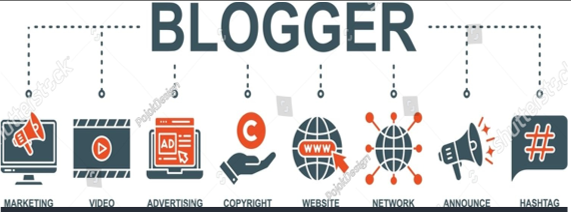
This blog is written by Ashutosh Mishra BBA.LLB 4th year student of Bharati Vidyapeeth (Deemed to be University) New Law College, Pune, Maharashtra.
This blog talks about the role of Intellectual Property for Creator Educators and Social Media Influencers. While copyright and trademark are useful for the creators to safeguard their artistic work. This blog highlights the challenges faced by the creators on social media platform like uploading their content in form of short videos by the other person, without the permission of actual owner. This blog also provides the solution like taking copyright for their artistic work and taking trademark for the protection of their brand.
INTRODUCTION
IP the biggest support for Creator Educator and Social Media Influencer. As time changes things also start changing. In recent period we have seen tremendous increase in the social media platform and its users. It is not remained only for the purpose of entertainment but also created the new platform for doing the business. It has given a new opportunity to many talented entrepreneurs and creator educators to share the educational or entertainment content with us and to get popular with their work. It has provided the forum to earn money by applying their human mind. The human intellect is among the world’s most extraordinary phenomena, distinguished by its exceptional cognitive prowess. The original concepts, innovations, designs, and creative works born from human intellect are collectively known as Intellectual Property. It consists of scientific inventions, technological progress, literary and artistic works, trade-related innovations, and more. Human mind holds the immense vale and need a safeguard and this safeguard is given by the Intellectual property laws.
Keywords: –
Creator Educator, Influencer, Social Media, Human Intellect, Intellectual Property Rights (IPR)
Challenges Faced by Educator-Creators and Social Media Influencers in Navigating the Complexities of the Virtual World
In this emerging digital age, safety of the content published by the artist is the major concern. It’s been getting more difficult to protect the content of the publishers as there are modern ways which increases the chances of content theft. Now a days the most common and easiest way of stealing the content of other creator without their consent is short- videos. As we have discussed already that this digital market is depend up on trends and for the survival in the market, creators must go with the trend. Recently the market has seen the new trend of short video content, more consumers are attracting towards it. Going with the trend content creators also started uploading short videos in the form of YouTube shorts and Instagram reels. Some of the creators are uploading their long videos in short videos to engage with the customer and get more views but their contents are taken by other person without their permission and the actual owner of the content is getting trapped in legal complications. Copyright Law has played a very crucial role in cushioning the exploitation of artist work by offers economic incentives, allowing creators to monetize their creations and earn a living offers economic incentives, allowing creators to monetize their creations and earn a living.
Normally the copyright law is very clear about the long videos but the question is the short videos. How it can be protected?
From this new shift towards the short videos usually called as YouTube shots and Instagram reel has created the problem to the Creator Educator. They provide their content on annual or monthly subscription bases but their content got publish by the other people in form of short videos which leads to economics loss to original creators. In such a condition, it is important to understand how such short videos could be protected under the Copyright law. Section 13 of the Indian Copyright Act, 1957 outlines the work that could be protected under the Copyright Act.
Section 13(1) of the Indian Copyright Act, 1957
“13. Works in which copyright subsists. — (1) Subject to the provisions of this
section and the other provisions of this Act, copyright shall subsist throughout
India in the following classes of works, that is to say, —
(a) original literary, dramatic, musical, and artistic works;
(b) cinematograph films; and
(c) sound recording”
According to this provision, the copyright can subsist in short videos under the head of “cinematograph film”.
Here is the question whether the short video works comes under the cinematograph films or not?
As per the reading of the Copyright Act, 1957:
“cinematograph film” means any work of visual recording and includes a sound
recording accompanying such visual recording and “cinematograph” shall be
construed as including any work produced by any process analogous to
cinematography including video films.
After reading the definition of the cinematograph film it become clear that the short video work comes under it.
Duration of YouTube shorts or Instagram Reel that can be protected under Copyright law Case study-
- Sara Nadzirah Binti Zulkifli v Khirulanuar Bin Mohamadiah
In a case of Malaysia named Sara Nadzirah Binti Zulkifli v Khirulanuar Bin Mohamadiah: In this case, the plaintiff, a 31-year-old self-proclaimed influencer, has close to 100,000 followers on Instagram as of April 1, 2022. The defendant, an Advocate and Solicitor of the High Court of Malaya, also sells durian through his business, Ezydurian Services. He claims to have over 318,000 followers on his Facebook account as of August 13, 2022. The dispute arose when, on February 3, 2021, the plaintiff uploaded a 51-second video of herself eating durian on Instagram, which garnered over 4,200 likes and 289 comments. Four days later, on February 7, 2021, the defendant uploaded the same video on his Ezydurian Facebook account without her permission or consent to promote his durian business. The plaintiff demanded that the defendant remove the video, but he refused. This led her to file a lawsuit against him for copyright infringement. In this case, the court ruled that the plaintiff’s work was protectable as a cinematograph film under copyright law. The court ordered the defendant to remove the plaintiff’s copyrighted 51-second video from his Facebook platform, Ezydurian Services. This decision demonstrates that even brief videos, such as the 51-second clip in this case, are eligible for copyright protection, reinforcing the rights of content creators in safeguarding their intellectual property. The court’s order emphasizes the legal ramifications for the unauthorized use of copyrighted material and underscores the importance of obtaining permission before repurposing or sharing someone else’s content, even in a marketing context.
Future of Content Educators and Social Media Influencers
Unfortunately, the future of content educators and influencers is up in the air, as we know that the internet has no boundaries and it is trouble free to use others content with their knowledge. The only way to protect the rights of the content educators and influencers is to educate them. Every creator should have knowledge regarding their rights and duties before entering the digital platform. As government is doing their work by implementing the new laws related to IPR and providing remedies to creators but it is a basic responsibility of the influencers and creators to keep themself vigilant regarding to their rights.
Why should Influencers and Content Educators should register IP?
In this Digital age it’s very easy to use the contents of other creators for personal benefit. As discussed earlier the trend in social media platform is shifting towards the short videos and in the platform like Instagram, Facebook, and YouTube any person can use the short clips from the content of other to establish the secondary meaning in the mind of customers. By registering the IP, creators can stop the unlawful gain and use of their content without their knowledge.
How the rights of the creators and influencers can be protected?
As the engagement of the creators and influencers are increasing day by day and its important for them to protect their content, channel, brand, or website. Going with the time legislation has implemented various laws to protect the interest of the creators and influencers. An artist who makes videos, photos, or record the audio, or write any book, can register their work under the Copy Right Act 1957. They can also protect their brand logo, design, slogan, or product packages by registering it under the Trade Mark Act 1999. Then no one can infringe their intellectual property right by using their content without seeking the permission of the actual owner.
Conclusion
Social media platforms have given lots of opportunities to creators and to make their career in their respective fields. But these opportunities came with the responsibility too. Creators should have knowledge about their rights and duties regarding their Intellectual Property. So, accepting all the challenges in the digital age, creators should use the technology to safeguard their copyright and trademark rights.
Ashutosh Mishra BBA.LLB 4th year student of Bharati Vidyapeeth (Deemed to be University) New Law College, Pune, Maharashtra
